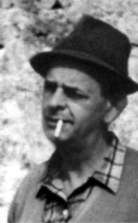
Gurdjieff International Review
Record of a Search
Working with Michel Conge in France
By Ricardo Guillon
The following excerpts are taken from Chapter 14 (Emotionality) of Ricardo Guillon’s recently published book, Record of a Search: Working with Michel Conge in France, Toronto: Traditional Studies Press, 2004, pp. 83–91. Dr. Conge was a French physician and pupil of Gurdjieff in Paris. The book can be ordered from the publishers website: www.traditionalstudiespress.com.
Something unusual—the meeting started and no one spoke. “Paul, you have not spoken for a long time,” said Dr. Conge. “Take this.” He handed him a piece of candy. Paul took it and then began to relate his experience. “He needs a piece of candy in order to start talking. Does anyone else want some?”

With a sense of foreboding, one man stated that he saw himself asleep all the time. Dr. Conge replied, “But you stay there; you do not search beyond that. It is true, most of the time we are asleep or identified. But we cannot deny that in certain moments we experience a different taste, a sensation of being, accompanied by a feeling that makes us believe in something else. This inner taste gives us a perspective, a reason for living.
“As Mr. Gurdjieff has said, moments when we are able to position ourselves squarely between external events and this inner life correspond not to a ‘candidate’ for a man, but to a ‘man not in quotation marks’.
“Our situation is not ‘outside’, where a man is moved by surface events, nor is it ‘inside’, where a man is taken by emotion and tyrannized by his functions. It is a precise balance, an equidistant position that allows me to appreciate and understand that I am these two lives.
“Then I will see that I have centres whose functioning I can get to know without becoming that functioning.
“The centre of gravity is neither in the head nor in the emotions. It is in that place where I recognize a feeling of being that allows me to search. This is a place where I become interested in beginning the work of understanding my situation and everything that is within my capacity. Otherwise, I will be lost, following the game of emotions and functions. If the master is absent, the functions take over.”
Dr. Conge recalled a Zen story in which one finds that central place and then realizes what an idiot one has been in resisting, being identified, or wanting to do.
“There is a quiet, inner place that allows everything to happen. I can remain at the centre—circling around myself, even functioning. It is possible to feel an emotion and stay with it. For example, to reprimand someone without falling into the emotion; then, both the one who reprimands and the one being reprimanded will benefit. In that moment, rather than being driven by a function, I would be acting from wholeness.”
“I find myself being taken by opposites,” I said. “I understand that there is nothing to be done. Nevertheless, an action is necessary. I see the passive position of receiving, and I see an activity, perhaps emotional, that makes receiving possible.”
“You become entangled,” responded Dr. Conge. “If you could manage to perceive and maintain that feeling of self—that central point—why would you need anything more? The rest will come by itself. From this central point, I observe my functions beginning to turn, my head beginning to think. . . Let it think! I remain there, observing.
“If you do the exercise seriously, you begin to relax only in order to have that feeling, to realize that that central point exists. It is the moment that one does something that one is taken by the functions. We need to be like the sun that radiates from its centre to the outside.”
A very emotional young woman started to speak but was unable to continue with what she intended to say.
Dr. Conge said, “It is a pity that, when you were about to speak of a feeling, you did not continue. Emotion took hold of you. When a sensation or a feeling appears, it is important to remain as still, as motionless, as possible. This way, other parts of myself, my other centres, can learn about what is taking place, and more than one centre can participate. Otherwise, one centre says ‘I’, the others say nothing or resist, and I am lost.
“We are able to recognize two types of emotion, those that take me away and lead to nothing objective, and those that show me a possibility, predisposing me in a certain way to search.
“There is a paradox between the concept of ‘not doing’ and of something being demanded of us, something that must be done. Normally, we feel a need to do and we express this need in art, in accomplishments, or in other important things. These acts of ‘doing’ are the unconscious responses to something being demanded of us—a certain creativity. We need to find out what this demand is about. What is really demanded of us is to take that concept, which is there for a reason, and come closer to its essence.
“Without human participation, there is a danger that at a given moment the Law of Octaves may continue mechanically. This would occur at the expense of man’s potential destiny.”
~ • ~
| Copyright © 2004 Gurdjieff Electronic Publishing Featured: Fall 2004 Issue, Vol. VIII (1) Revision: November 1, 2004 |